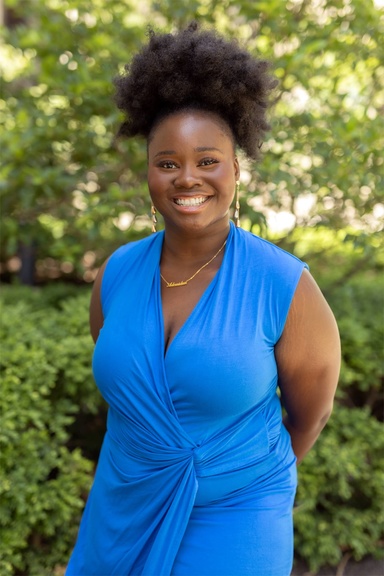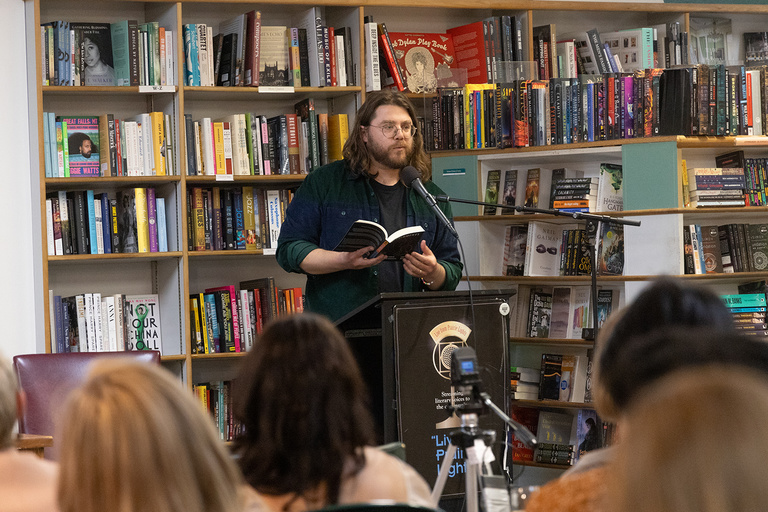Nonfiction writing is often misunderstood as a genre, one that eschews creativity to focus on the external through objectivity. However, the Nonfiction Writing Program (NWP) gives writers the opportunity to push back against stereotypes of the form and assert the creativity and vulnerability inherent in writing nonfiction.
Lucas Mann, associate professor in English & Communication at the University of Massachusetts Dartmouth, is an author and graduate of the NWP.
“There's still a lack of a frame of reference for nonfiction among students,” Mann says. “At Iowa, my idea of how many different ways nonfiction could suit me became apparent.”

For Mofiyinfoluwa (Fi) Okupe, a third-year MFA student, the ethos of the NWP allows her to focus on her craft and affirm the importance of excavating internal landscapes as a function of nonfiction writing despite misguided expectations of the genre.
“Coming to Iowa made me take myself seriously as a writer,” Okupe says. “For me, nonfiction as a genre is a tool for self-expression, but more importantly, self-revelation.”
Taking writing seriously is a source of pride for the University of Iowa and for Iowa City as a UNESCO City of Literature. University grants and resources afford writers in the NWP unique opportunities to devote time and energy to their practice.
Both Mann and Okupe were recipients of the Stanley Award for International Research during their time in the NWP.
“I went to Venezuela for a month to look at baseball academies,” Mann describes. “I was writing my first book about minor league baseball and a lot of the players that I met in Iowa were either from Venezuela or had gone to these academies.”
Okupe traveled to Nigeria to work on her project Mothertongue: Matrilineal Reckonings and Remembrances. “Mothertongue is a project committed to tracing matrilineal ancestry through the land of southwestern Nigeria,” Okupe explains.
Centering women’s stories is a cornerstone for Okupe’s work.
“Women’s stories have the potential to change the world and to reveal to us things about ourselves,” Okupe says. “None of our experiences are singular. We are all interwoven in a web of love and pain and hope and healing. I want the work that I do, both on and off the page, to constantly reflect that.”
Writers supporting writers through mentorship and community
Writers in the NWP receive integral support from faculty mentors and their community of peers in the program.
Okupe highlights the invaluable growth she experiences workshopping her writing with her thesis advisor, Assistant Professor Tisa Bryant.
“Professor Bryant has caused me to be so much more self-interrogating,” Okupe says. “She’ll point out if she thinks I’m withholding something, which is fine to do as long as you know why you’re doing it.”
Alongside mentorship from faculty, the students in the program provide fundamental learning experiences for one another. Mann says, “The kind of students that were in the program and the kind of work that those folks were doing was just as challenging and exciting as the classroom.”
During their time in the NWP, graduate students also teach undergraduate classes in creative nonfiction.
Teaching carries potential to engage a reciprocal process of examining and rethinking one’s own work. Okupe describes how teaching opens new perspectives about her writing.
“I was able to articulate things differently from occupying the position of an instructor,” Okupe says. “The students helped me to process my work differently. Teaching creative nonfiction at the University of Iowa enriched my writing because anything you teach you get better at.”
Teaching also involves cultivating a classroom environment where students, who may or may not think of themselves as writers, trust the space and feel free to express themselves.
“There's something vulnerable and at its best sort of sacred about the interaction of asking people to trust a group of, in some cases, strangers, with not only their personal selves, but their artistic selves,” Mann describes.
“One of my main jobs as a teacher is trying to make other people feel welcome and supported in the act of sharing themselves and their work,” Mann says.
The role of vulnerability in creative nonfiction writing
A sense of vulnerability in writing nonfiction is not relegated to new students. Okupe speaks to the importance of vulnerability for nonfiction as a genre.
“I think vulnerability is an incredible pillar of faith and relationships,” Okupe says. “When we refuse to hide, we are most powerful, and I bring that into my writing.”
For Okupe, this vulnerability takes the form of mining experiences related to topics that people tend to shy away from. “When I write, I'm always trying to pull up things that I know that I would rather hide,” Okupe says. “Every single time I press into that pressure point, the results are so fruitful.”

Mann’s most recent work, Attachments, which was published this spring, chronicles his experiences of fatherhood, weaving his own personal accounts with cultural representations of it. “Attachments is my fourth book. It's my first essay collection,” Mann says, “so in some ways, it feels like getting back to the kind of shorter form, experimental stuff that I was doing in graduate school.”
Okupe hopes to publish her writing one day and aspires to build an organization that supports and highlights nonfiction writing within the African continent.
“We have lots of programs that facilitate growth for poetry and for fiction,” Okupe says, “but nonfiction can get left behind because as a genre, it's in its infancy on the continent.”
“I want to build community around writing. Writing is not a solitary act.” Okupe says.
Both Okupe and Mann’s experiences, work, and aspirations underscore the far-reaching impact that the NWP has on present and future writers across the nation and globally.